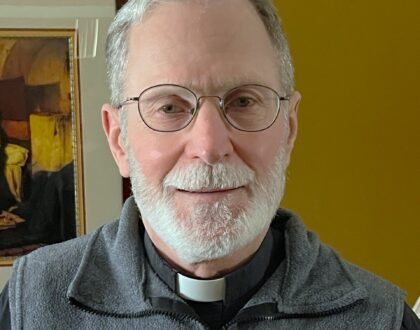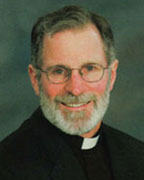Homily, February 11, 2024

From the Pastor
The leper in today’s gospel makes a bold, heartfelt request of Jesus. Context and tone play a significant role in this encounter. Who is this person? Identified as a leper, he was labeled as an unclean sinner, rejected, and put on the margins of society. His illness implied he was suffering punishment for a sinful offense against the Law. But who was this person before he was found with a skin ailment?
Was he on the lower end of the economic and social ladder of his time? Was he a respected leader, a person of means, or holding an important role in his community? Regardless, found with the splotch of a skin disorder, he was immediately labeled unclean and relegated to the outer boundaries of society. What gave him the courage to speak so boldly to Jesus knowing the Law ordered him to keep his distance from others?
This man may have been so desperate in his isolation and social rejection that breaking a religious law was of no concern to him. This is not likely the case. Even if Jesus granted his request, he would remain liable for his religious code violation with some punishment under the Law. It is more likely that the man, in desperation, put his faith and trust in Jesus with the hope of a restored life.
“If you wish, you can make me clean.” This is a bold statement of hope built on faith. The word ‘wish’ could have several expressions. He could have said, ‘if you will it.’ Or ‘if you desire it, you can make me clean.’ This man’s request strongly indicates that despite his social and religious rejection, his sense of self is still intact. Feeling unworthy and humiliated by his status as ‘unclean,’ this man continued to hold a strong sense of his personhood.
This person has a deep desire to be made clean, to be whole. Jesus shares his desire, “I do will it. Be made clean.” Immediately, the man is free from the leprosy. Not only was he healed of his skin disorder but also to the full stature of his personhood as an acceptable member the community. His bold request has saved him. His deep desire is satisfied, and he becomes a witness to the compassion and power of Jesus.
This person of faith teaches us an essential lesson of the spiritual life. Even as a leper, unclean and rejected by the Temple and society, he remained at home enough to himself to know his deepest desire. He wanted to be whole, to be made clean and to live the life God intended for him. What does this mean?
This person believed in God and trusted in the providence of God’s care. He could see the power of God in Jesus in a way that stirred his soul to voice a bold request. Notice the man believes that what he desires will also be the desire of Jesus for him. This kind of request takes guts and courage that what he most needs and desires will also be the desire of the One who can give it to him. This is the spiritual truth God desires all of us to know and act upon.
Spiritual and psychological authors are increasingly writing about the meaning and dynamics of human desire. Such writing is bearing fruit in personal self-understanding as well as maturing insights that lead to spiritual growth. One example is the maturing woman who shares with her therapist her deep longing for marriage and children. The therapist asks, what is your deepest desire? She feels unheard. She believes her deepest desire is a husband and children. He presses her to consider what is underneath her longing. Much to her surprise, she found a deep longing for love, connection, with significance in the lives of others. On the surface, this meant a husband and children. More deeply, she discovered a spiritual hunger and desire for personal validation through love, belonging, with meaningful care for and from others. She realized what she most deeply wanted was the same thing God wanted for her. Still wanting marriage and children, she could now find love, validation, and significance through her relationship with God in a new way.
Human desire has many faces. Given our culture, when we hear the word ‘desire,’ we tend to think of comfort, pleasure, flesh and blood satisfactions. Don’t let your imagination go too far here. Our culture drives these down our throats daily through media and advertising. More maturely, true human desire comes from the heart. They are spiritual. Our heart and soul longs for love, meaning, belonging, validation, purposeful autonomy, and righteous passion. These are the desires that God desires for us because they are from God. They come from the fire of our souls longing for God. This is the boldness that gave the healed leper the courage to present his deepest desire to Jesus.
What is your deepest desire? Look under the surface, from the heart. We all need and want things. That’s normal with discipline and prudence. Human beings also share a deep longing for God that is often obscured or distracted by more worldly interests. Listen to your soul. The former leper did, acted on his deep desire, and found salvation in body, mind, and spirit. God shared his desire and it bore great fruit. What do you most want that God wants for you?
Father John Esper
Recent Sermons

Homily, March 30, 2025
March 27, 2025

Homily, March 23, 2025
March 20, 2025

Homily, March 16, 2025
March 11, 2025

